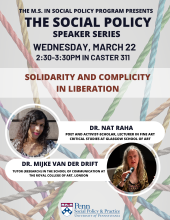The MSSP program is hosting the next Social Policy Speaker Series featuring Dr. Mijke van der Drift and Dr. Nat Raha, international guests and scholars from London and Scotland respectively. They will be joining us on Wednesday, March 22 from 2:30-3:30pm for a talk titled “Solidarity and Complicity in Liberation.” They will discuss transfeminism as ethical and politicized collective practices of care and solidarity. We invite you to join us in Caster 311. Please see a description of the event below. Register here.
In this talk we discuss transfeminism as ethical and politicised collective practices of care and solidarity. In contrast to arguments that read gender through the pressures of legible social categories, or that root politics in the possibility of individual rights, our reading of transfeminism emerges from femme and the heterogeneous collectivities that form through and around femme lives. We emphasise (learning from Marquis Bey (2020)) that transfeminism opens approaches to embodiment and social formations, and thereby holds space for collective flourishing while simultaneously resisting the violence of categorical gendering. From the collective spaces of femme thus emerges a radical coalitional ethics that enables anti-oppressive world-making and collective autonomy.
We conceptualise femmeness as an aesthetics of gendering, saturated with generosity, emerging through the multilogical engagements of collectivities (not just a claim to becoming “who one is”). Femme describes a constellation of queer, gendered expressions emerging from marginalisations of race and gender, disability, and victim/survivor. Using experiences of desire, belonging, and generosity, but also harm, femme works to uproot the expectations of femininity, which in turn inform the building of community and collective power. This involves navigating relations, contradictions, and contestations. With femmeness rooted in working against dominating structures, it does not ‘manage expectations’ in the manner demanded of normative femininities as reproductive labour. Instead, femmeness plays with expectations and relationalities and is in that sense not predicated upon mastery, but on embellishment, nurturing, and relishing the joyful aesthetics of gendered play.
Thinking through complicity as an abolitionist practice (Lugones 2003, Drift 2021, Bernard 2021) allows an ethics to change form, from a mono-directional or a law-like single structure, to a navigation of different pulls and pushes that retain collective imaginaries of liberation. Femmeness opens up navigating spaces where complicities are at play. Instead of monological attributions such as ‘propriety’ ‘virtuousness’ and ‘rightness’ that encapsulate relations in a single structure, the question of ‘how do people relate to me’ becomes attentive to difference and collectivity. This acute awareness replaces assumed commonality and gauges communalities in practice. Simultaneously, this awareness also highlights complicities as a factor in coalition building. Accountability for complicities can provide a motivating force for dismantling structures. Transfem(me)inism highlights how coalitional engagements contest purification and thereby hold space for differences. At the same time, such collectives are at any time in need of accountability and to face up to complicities.
Drs. Nat Raha and Mijke van der Drift
Nat Raha and Mijke van der Drift are co-authoring a book Trans Femme Futures: An Abolitionist Ethics for Transfeminist Worlds, forthcoming with Pluto Press. They have co-edited the Radical Transfeminism zine, and have co-authored essays for The New Feminist Literary Studies (Cambridge U.P., 2020) and Darkmatter journal (forthcoming).
Dr Nat Raha is a poet and activist-scholar, based in Edinburgh, Scotland, and a Lecturer in Fine Art Critical Studies at Glasgow School of Art. Her work focuses on transfeminism, LGBTQ+ genders and sexualities, practices and collectives of care and social reproduction, racial capitalism and decolonization, across poetry, politics, theory, print, art, and the hi(r)story of liberation movements.
Nat is the author of three collections of poetry: of sirens, body & faultlines (Boiler House Press, 2018), countersonnets (Contraband Books, 2013) and Octet (Veer Books, 2010). Recent anthologies featuring her work include 100 Queer Poems and We Want It All: An Anthology of Radical Trans Poetics. Her creative and critical writing has appeared on Poem-a-Day, and in South Atlantic Quarterly, TSQ: Transgender Studies Quarterly, Queer Print in Europe (Bloomsbury, 2022), and Transgender Marxism (Pluto Press, 2021). Nat co-edited 'Imagining Queer Europe Then and Now', Third Text special issue (January 2021), and co-curated the 'Life Support: Forms of Care in Art and Activism' exhibition at Glasgow Women's Library (2021).
Nat holds a PhD in queer Marxism from the University of Sussex.
Dr Mijke van der Drift received formal education in Dance, Theatre and Philosophy in Amsterdam, Utrecht, London, Maastricht and Berlin. Mijke’s work focuses on the ethics and philosophy of movement and transformation. Currently, Mijke works as Tutor (Research) in the School of Communication at the Royal College of Art, London. Mijke has taught at Goldsmiths, University of London, Royal Academy of Art, The Hague, the School for New Dance Development and The Sandberg Institute, Amsterdam, and many non-academic workshops.
Mijke is a founding member of the arts collective Red Forest. Red Forest performed Sambatas Stagings in Kyiv (2021), curated a series of Radiograms titled Nomadic Cosmologies and Fugitive Power for the German Pavilion at the 23rd Milan Triennale (2022), and are currently making On the Loss of Energy: Radiograms from the remnants of collisions for the Helsinki Biennale (2023). Red Forest has been granted a multi-year grant for their research project Energy-Matters in the context of war. Neo-extractivism, fossil fascism, and the post-national question from the Kone Foundation, Finland.
Mijke’s writing has been published in academic and non-academic outlets. Currently Mijke is working on a monograph, titled Multilogical Ethics: dynamics of transformation.

 The Program in Gender, Sexuality, and Women’s Studies
The Program in Gender, Sexuality, and Women’s Studies